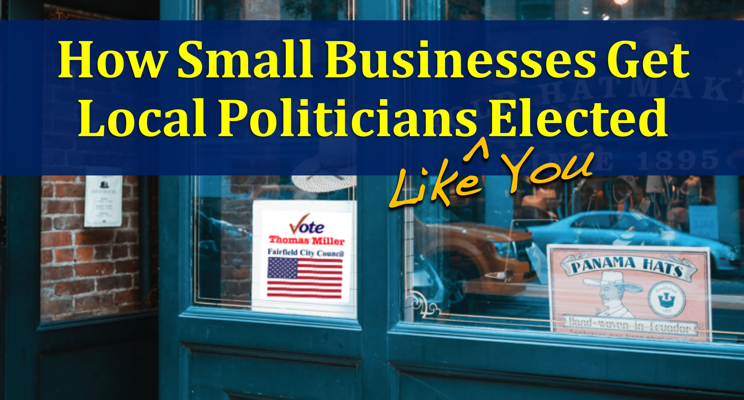
Helping small businesses succeed is a secret solution for elected officials to get elected, re-elected, and improve their popularity. The reasons are compelling and the results are effective. This opportunity is even more important for elected officials because, unlike many other groups, small businesses are a constituency they can actually directly help and influence.
1. People trust small businesses more
Resent research from Gallup shows that people trust small businesses more than they trust the police, the church, the president and congress, banks, public schools, newspapers, and television news. The only thing people trust more than small business is the military. So, if you are helping the small businesses in your community succeed, those small businesses are trusted by their customers about the elected officials they should vote for ad that are best for the community.

2. Small businesses influence voters
There is a reason that having your election signs posted in the storefronts of your local businesses delivers results and votes. First, as is evident from Gallup research, small businesses are trusted above almost everyone else. So, when customers see your sign in a local business window, they know that a business they trust trusts you to lead the community. Second, although your election signs are posted in in front of homes on residential lawns, more people are repeatedly coming into commercial businesses and being exposed to your election name and message. People may not know their neighbors that have your election sign in their lawn but they know the small business they are patronizing and trust that business to feed them, do their taxes, dress them, cut their hair, cloth them, and more. That’s authentic trust and the trust the small business has in you is shared with their patrons.

3. Small businesses help your local economy most
Over 99% of companies are small businesses, they create 64% of net new jobs (Source: US SBA), and contribute relatively more economic value to your local economy than national big businesses. For example, $100 spent in your community with an independent local business creates $68 in economic impact compared to only $43 with a national chain competitor. (Source: Civics Economics) More money retained in your community makes your residents wealthier and government services better funded. These small businesses help you, your community, and public services all the time.
Of course, it’s not just about getting elected and re-elected. It’s about keeping your constituents happy throughout your term of elected service. A happy business constituency means they aren’t coming to your public meetings complaining and, instead, are creating jobs, expanding business, generating local taxes, and using profits to support local organizations like youth soccer.
There are important things that elected officials can do to help the local businesses in their community to succeed, keep them happy, and foster an advantageous business climate. In addition, many of these things can be done quickly, easily, and with small budget investments.
As an elected official you should implement all of these strategies to become a hero to your small businesses.
1. Take advantage of existing small business assistance programs
Your taxes already pay for national programs provided by the US SBA, SCORE, and SBDC that provide classes and individual assistance for entrepreneurs and small businesses. Your local community colleges may provide courses too. All you need to do is make sure that you are getting your fair share of government-provided small business assistance through these programs in your community and that you are promoting them to your local small businesses so they participate.
2. Give your small businesses the information and tools to succeed
Today, the most successful companies use data to make the best decisions. But small businesses often can’t afford this information. Yet, in today’s information economy, the businesses without information are at greater risk of failure. However, one of the easiest, fastest, and most affordable things you can do to deliver small business assistance it to provide your local entrepreneurs with market research and business intelligence on your government website so they can make smarter decisions how to start, optimize, or grow their companies. This can be simply implemented by adding SizeUp LBI software to your website and smart government organizations are already doing this to give their local businesses an advantage.
3. Meet with and listen to small businesses
You are uniquely positioned to learn, empathize with, and solve government barriers to the success of small businesses in your community. But to know what they need from their government you need to meet with them and listen. You may not be able to solve all their problems but by meeting with them they will know that you care. Sometimes people just need to be heard. However, you may also discover problems and patterns of business challenges that you can solve through your power as an elected official. As an additional benefit to you, when you are meeting with these businesses you can share your vision and convince these businesses of your plan for a better community.

Small businesses are the backbone of the American economy. Successful and happy small businesses create vibrant communities, employ local residents, and fund needed government services. In addition, small businesses are trusted by their customers. As an elected official, if you keep your small businesses happy, they are going to let their customers know who the elected officials are that helped make your community a better place.



